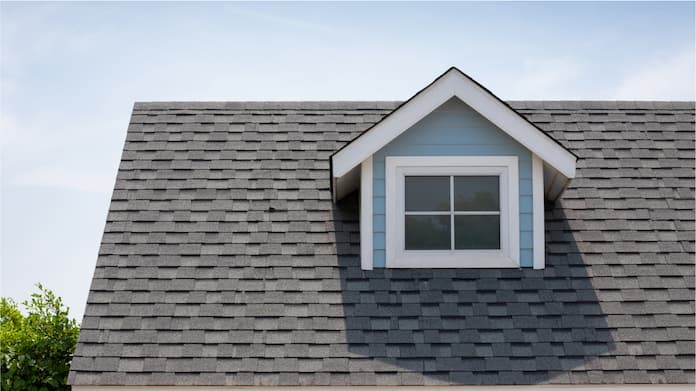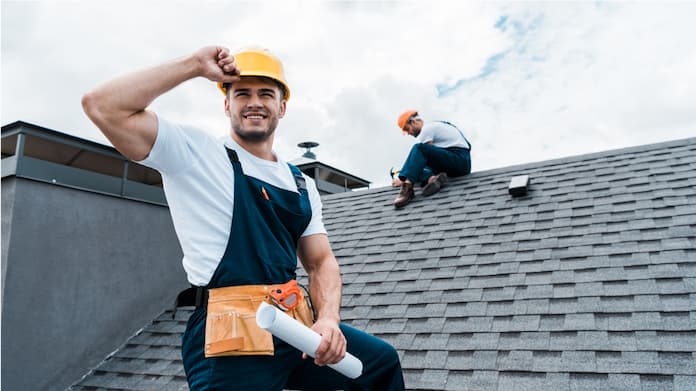How Much Does a Composite Roof Cost?
Thinking of replacing your roof but unsure if you’re ready for the financial hit? Composite roofing combines affordability and durability, giving you the best of both worlds. But how much does it actually cost, and can it really save you money in the long run? Let’s break down all the costs, so you can make a smart investment in your home.
Key Points
- Composition roof cost usually ranges from $7 to $14 per square foot, with an average total installation cost between $15,000 and $26,500.
- The final price can vary based on factors such as the type of roofing, roof size, brand, location, roof pitch, and labor.
- Composite roofing offers durability, weather resistance, and a wide range of aesthetic options, all while being lightweight and eco-friendly.
Cost Factors to Install Composite Roofing

As the global market for composites is forecasted to reach 144.5 billion U.S. dollars by 2028, it’s clear that composite materials are becoming increasingly popular across various industries, including roofing.
If you’re considering composite roofing for your project, it’s important to understand the key cost factors that come into play. By being aware of these, you can better plan your budget.
Type
Keep in mind that each type of composite roofing, like shingles, tile, slate, and shake, offers a unique aesthetic and price point. It’s important to choose based on both your budget and the style you want. Composite roofing shingles price is on the low end, while shake tends to be on the higher end.
| Type | Average Cost Per Sq Ft Installed | Description |
|---|---|---|
| Shingle | $6 – $12 | Composite shingles mimic asphalt or wood shingles and are affordable. |
| Shake | $6 – $18 | Composite shakes replicate the rustic look of cedar wood, more detailed and expensive. |
| Tile | $6 – $14 | Composite tiles resemble clay or concrete tiles, offering a Mediterranean look. |
| Slate | $9 – $12 | Composite slate mimics natural slate for a high-end appearance. |
Roof Size
Larger roofs need more materials, labor, and time to finish. Composite roofing costs are usually calculated per square foot, with prices typically between $7 and $14 per square foot for both materials and installation.
As the roof gets bigger, you’ll need more composite shingles or tiles, and extra labor, which raises the overall cost.
| Roof size (Square Feet) | Estimated Cost to Install |
|---|---|
| 500 | $3,500 - $7,000 |
| 1,000 | $7,000 - $14,000 |
| 1,500 | $10,500 - $21,000 |
| 2,000 | $14,000 - $28,000 |
| 2,500 | $17,500 - $35,000 |
| 3,000 | $21,000 - $42,000 |
| 3,500 | $24,500 - $49,000 |
Brand
| Brand | Price per Square |
|---|---|
| Brava | $700 – $1,150 |
| CeDUR | $800 – $1,600 |
| DaVinci | $400 – $1,200 |
| EcoStar | $300 – $800 |
| Inspire | $600 – $1,050 |
| Quarrix | $430 – $950 |
Labor
Labor makes up about 50-60% of the total cost of composite roofing installation, typically costing between $1 and $5 per square foot. The exact price depends on factors like the roof’s complexity, slope, and local labor rates. Steeper or multi-story roofs take more time and require extra safety precautions, driving up labor costs.
Removing an old roof adds another $1 to $3 per square foot. Premium materials and extra features like underlayment, rafters, and ventilation can also increase labor expenses.
Location
The cost of composite roofing varies by location due to differences in labor rates, climate needs, material availability, and local regulations.
In areas with a higher cost of living, such as the Northeast and West Coast, installation prices are usually higher, while the Midwest and Southeast tend to have more affordable labor.
Harsh climates may call for more durable materials, raising costs, and local permits or building codes can add extra expenses.
Roof Pitch
Steeper roof pitches take more time and effort to work on because of safety concerns. Roofers need specialized equipment and have to move carefully, which raises labor costs. Plus, steeper roofs have a larger surface area, requiring more composite materials, adding to the overall cost.
Permits
Permits for composite roof installations usually cost between $100 and $500, depending on local building codes. They ensure the project meets safety standards and may require multiple inspections, which can sometimes extend the project timeline.
While permit fees are a small part of the overall roofing cost, they’re mandatory and can vary based on the roof’s location and complexity.
Composite Roof Cost vs. Asphalt Shingles
Composite roof shingles are significantly more expensive than asphalt, but the trade-off is increased durability and visual appeal.
When comparing composite roof shingles vs asphalt cost, composite shingles range from $7 to $14 per square foot, while the average cost of shingle roof made from asphalt is more affordable, typically between $3 and $5 per square foot.
Though asphalt is cheaper upfront, it only lasts 15-30 years, whereas composite shingles can last 40-50 years, resist stronger winds (up to 190 mph), and are often made from eco-friendly, recycled materials. Asphalt may also require more maintenance and earlier replacement.
Metal vs. Composite Roof
Metal roofs are known for their durability, lasting over 50 years, and offering strong resistance to extreme weather and fire. They’re also energy-efficient, reflecting heat to reduce cooling costs. On the downside, they can dent easily, which comes with a higher upfront cost.
Composite roofs, made from materials like recycled plastic, are more affordable and can mimic the look of natural slate or wood. They typically last 30-50 years, are easier to install and maintain, but may need replacing sooner than metal roofs.
Both options are environmentally friendly. Metal roofs are best for long-term durability, while composite roofs are a more budget-friendly choice with flexible design options.
Composition Roof vs. Architectural Shingles
Composition roofs and architectural shingles are both made from asphalt, fiberglass, and mineral granules, but they differ in design and durability.
Composition shingles are versatile and can last 20–30 years, offering a variety of styles, some mimicking wood or slate. When it comes to composition shingles price, they are an affordable option for homeowners.
Architectural shingles, a premium type of composition shingle, are thicker, have a dimensional appearance, and provide better durability, often lasting 25–50 years. While more expensive, architectural shingles offer enhanced aesthetics and withstand harsher weather conditions compared to standard composition shingles.
Pros and Cons of Composite Roofing
Composite roofing offers a blend of advantages and disadvantages, making it an option worth considering for homeowners.
- Durability: Composite shingles are built to withstand harsh weather conditions, such as heavy rain, hail, and strong sunlight. They also resist rot, mold, and insects, which is ideal for humid climates.
- Aesthetic Versatility: Composite shingles mimic high-end materials like slate, wood shake, and tile, allowing homeowners to achieve a premium look without the same level of maintenance or cost.
- Lightweight and Easy to Install: Compared to materials like slate or tile, composite shingles are much lighter, making installation easier and potentially reducing labor costs.
- Eco-Friendly: Many composite shingles are made from recycled materials such as rubber and plastic, which helps reduce environmental impact.
- Longevity: When properly installed, composite roofs can last 40 to 50 years, outlasting many traditional roofing options like asphalt shingles.
- High Initial Cost: Composite roofing is considered a premium product, and its upfront cost is significantly higher than traditional asphalt shingles.
- Potential Fading: Over time, exposure to sunlight and the elements can cause composite shingles to fade or change color, which may affect the roof’s appearance without compromising performance.
- Ventilation Requirements: Composite roofs may require better attic ventilation compared to other types, such as asphalt shingles. Poor ventilation can lead to heat buildup and impact the longevity of the roof.
How to Save Money When Installing Composite Shingles?
To save money when installing composite shingles, you can implement these tips:
- Overlay the New Roof If the current roof is in good condition, install composite shingles over it to avoid removal costs.
- Simpler Roof Design Opt for a basic roof design with fewer slopes and corners to reduce labor costs.
- Off-Season Installation Install during less busy seasons (fall or spring) for lower contractor rates.
- Use Durable Materials Invest in long-lasting composite shingles to reduce future repair and replacement costs.
- Get Multiple Quotes Compare quotes from several contractors to find the best price.
- DIY Prep Work Handle minor tasks like clearing debris or old roofing nails to reduce labor costs.
Professional vs. DIY Composite Roof Installation

Although you can save around 50-60% of the total project cost by DIYing the installation of a composite roof, it requires significant time, and skills, and involves safety risks. Mistakes, such as improper sealing or installation, can lead to costly repairs.
On the other hand, professional installation guarantees expert workmanship, and efficiency, and often includes warranties, though it comes at a higher price. While DIY may be more affordable, professionals ensure long-term durability and safety.
When choosing a contractor, be sure to ask all the key questions about your project and check their online reviews. You can also use a tool like HomeBuddy to easily find expert local contractors and even get a free quote!
How to Hire a Professional?
To hire a professional for composite roof installation, you can follow these steps:
- Research Contractors: Search for licensed, insured professionals with experience in composite roofing through online platforms or referrals.
- Verify Credentials: Ensure they have the necessary licenses, and insurance, and are up-to-date on local building codes.
- Get Quotes: Obtain at least three quotes to compare costs, materials, and timelines. Include labor, materials, and extras like roof removal.
- Check References: Review their portfolio and ask for references from previous clients.
- Ask About Warranties: Confirm both the manufacturer’s and contractor’s warranties on materials and installation.
- Sign a Contract: Make sure the contract covers the work scope, timeline, costs, and any permits.
Conclusion
The cost of a composite roof typically falls between $7 and $14 per square foot, with total installation costs ranging from $15,000 to $26,500. The final price depends on factors like the type of material, roof size, brand, location, and labor fees.
While doing it yourself might save some money, it can lead to expensive repairs and added stress if not done properly. It’s best to hire a professional to ensure the job is done right. You can also use tools like HomeBuddy to find an expert local contractor and get a free project quote.
Frequently Asked Questions
- Are composite shingles worth it?
Yes, composite shingles are worth it for homeowners seeking durability, eco-friendliness, and design versatility. While they cost more upfront than asphalt shingles, they last longer (30-50 years), require less maintenance, and offer superior weather resistance, potentially saving money in the long run.
- Is it possible to get recycled composite shingles?
- Yes, it is possible to get recycled composite shingles. Many manufacturers use recycled materials like rubber and plastic to produce eco-friendly composite shingles, contributing to sustainability. These shingles offer durability, weather resistance, and reduced environmental impact compared to traditional options.
- Choosing between wood and composite decking - what’s best for you?
- Choosing between a wood and composite deck depends on your priorities. Wood offers natural beauty and a lower upfront cost but requires regular maintenance and has a shorter lifespan. Composite decks are more durable, low-maintenance, and eco-friendly, lasting up to 50 years but cost more initially.
